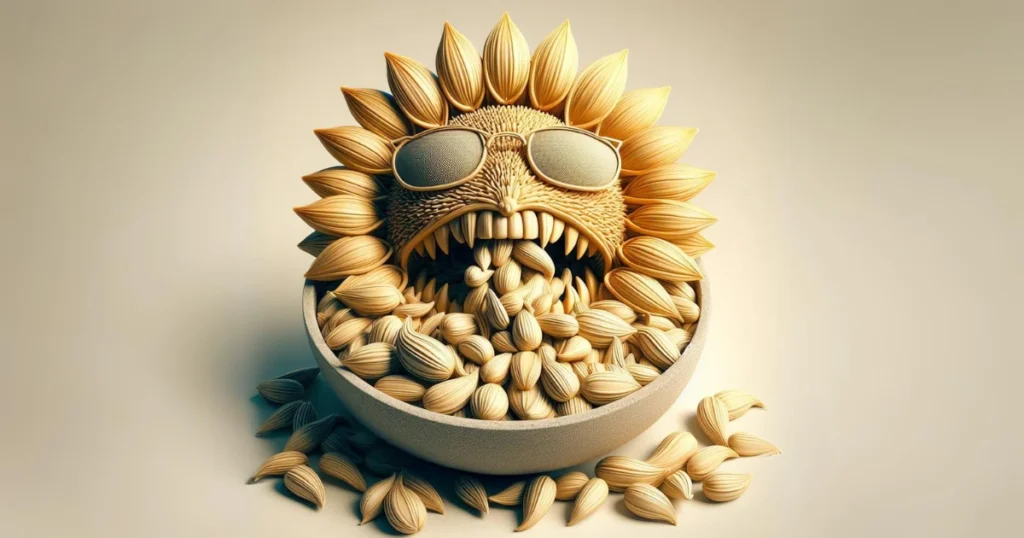
Drying the heart of the sunflower plant (Helianthus annuus L.) yields the seeds, which are rich in protein, vitamins, minerals, and cholesterol.
They are a versatile ingredient that can be enjoyed as a snack, in baked goods, or sprinkled on top of salad or yogurt.
It is possible that you may be curious about whether or not it is safe or nutritious to consume the shells, given that you can purchase them either whole or shelled.
This article discusses whether or not it is appropriate to consume the shells of sunflower seeds.
Can You Eat Sunflower Seed Shells?
The outer shell of sunflower seeds, striped with white and grayish-black colors, contains a kernel.
You can consume the kernel of a sunflower seed, also known as the meat. It is tan in color, chewy, and has a flavor and texture that are slightly reminiscent of butter.
It is common practice to roast, salt, and season whole sunflower seeds while they are still in their shells. This is a method that many individuals find enjoyable to consume. When it comes to baseball games, they are a fan favorite overall.
On the other hand, you must immediately spit out the shells and refrain from eating them.
Shells, also known as hulls, are tough, fibrous components that are challenging to chew. Because they contain a high concentration of fibers known as lignin and cellulose, your body is unable to digest them.
Shelled sunflower seeds are a more convenient and secure alternative to whole, roasted seeds. If you so desire, you are free to season them with olive oil, salt, and any other spices you prefer.
Health risks of eating the shells.
In the event that you mistakenly swallow a small piece of shell, you will not be in danger. On the other hand, if you consume a significant quantity, the shells have the potential to induce a blockage in your intestinal track, which can be extremely hazardous.
Any edible plant’s seed shells have the potential to accumulate in the small or large intestine, where they can form a mass known as a bezoar. In some instances, it may also result in bowel impaction, as well as constipation and pain in the intestines.
An impacted bowel occurs when a large mass of stool lodges in your colon or rectum. There is a possibility that it will cause discomfort, and in rare instances, it may even result in hemorrhoids or more severe damage, like a rip in your big tract.
During the process of removing a bezoar, it is frequently necessary to be under general anesthesia. An operation might be required in certain circumstances.
Sunflower seed shells may contain sharp edges that could scrape your throat if you ingest them.
What to do with the shells?
You can put the shells of sunflower seeds to use in a number of different ways if you consume a lot of sunflower seeds and do not want to throw them away.
By using them as mulch in your garden, you may reduce the likelihood of weeds developing around your plants. This is one of the options you have at your disposal.
Additionally, you can use them as an alternative to making coffee or tea. You only need to lightly toast the shells in an oven or frying pan, and then grind them using a spice grinder. Steep one tablespoon (12 grams) of the herb in one cup (240 mL) of boiling water.
Additionally, poultry and ruminant animals like cows and sheep can use ground hulls as roughage. The industrial sector typically processes them into fuel pellets and fiberboard.
Most nutrients are in the kernel.
Sunflower seed kernels are an exceptional source of protein and healthful fats. Additionally, they contain antioxidants, vitamins, and minerals.
Antioxidants are plant compounds that have the potential to prevent oxidative damage to DNA and cells. This, in turn, may lower your risk of developing conditions like cardiac disease.
One ounce (28 grams) of sunflower seed grains is sufficient to provide
- Calories: 165
- Protein: 5 grams
- Carbs: 7 grams
- Fiber: 3 grams
- Fat: 14 grams
- Vitamin E: 37% of the Daily Value (DV)
- Selenium: 32% of the DV
- Phosphorus: 32% of the DV
- Manganese: 30% of the DV
- Vitamin B5: 20% of the DV
- Folate: 17% of the DV
Sunflower kernel oil is particularly rich in omega-6 fatty acid linoleic acid, which helps to maintain healthy cell membranes. Omega-6s are dietary oils because the body is incapable of producing them.
The bottom line
We discourage the ingestion of sunflower seed shells.
The fibrous and indigestible nature of the shells may harm the digestive tract.
Be sure to spit out the husks of whole sunflower seeds if you prefer to consume them. Alternatively, one may consume shelled sunflower seeds, which solely contain the flavorful and nutritionally dense kernel.


